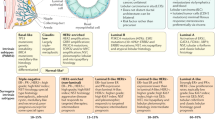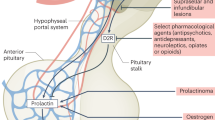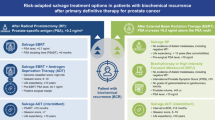Abstract
Prostate stem cell antigen (PSCA) is a recently defined homologue of the Thy-1/Ly-6 family of glycosylphosphatidylinositol (GPI)-anchored cell surface antigens. PSCA mRNA is expressed in the basal cells of normal prostate and in more than 80% of prostate cancers. The purpose of the present study was to examine PSCA protein expression in clinical specimens of human prostate cancer. Five monoclonal antibodies were raised against a PSCA-GST fusion protein and screened for their ability to recognize PSCA on the cell surface of human prostate cancer cells. Immunohistochemical analysis of PSCA expression was performed on paraffin-embedded sections from 25 normal tissues, 112 primary prostate cancers and nine prostate cancers metastatic to bone. The level of PSCA expression in prostate tumors was quantified and compared with expression in adjacent normal glands. The antibodies detect PSCA expression on the cell surface of normal and malignant prostate cells and distinguish three extracellular epitopes on PSCA. Prostate and transitional epithelium reacted strongly with PSCA. PSCA staining was also seen in placental trophoblasts, renal collecting ducts and neuroendocrine cells in the stomach and colon. All other normal tissues tested were negative. PSCA protein expression was identified in 105/112 (94%) primary prostate tumors and 9/9 (100%) bone metastases. The level of PSCA expression increased with higher Gleason score (P=0.016), higher tumor stage (P=0.010) and progression to androgen-independence (P=0.021). Intense, homogeneous staining was seen in all nine bone metastases. PSCA is a cell surface protein with limited expression in extraprostatic normal tissues. PSCA expression correlates with tumor stage, grade and androgen independence and may have prognostic utility. Because expression on the surface of prostate cancer cells increases with tumor progression, PSCA may be a useful molecular target in advanced prostate cancer.
This is a preview of subscription content, access via your institution
Access options
Subscribe to this journal
Receive 50 print issues and online access
$259.00 per year
only $5.18 per issue
Buy this article
- Purchase on Springer Link
- Instant access to full article PDF
Prices may be subject to local taxes which are calculated during checkout





Similar content being viewed by others
References
Alers JC, Krijtenburg PJ, Rosenberg C, Hop WC, Verkerk AM, Schroder FH, van der Kwast TH, Bosman FT and van Dekken H . 1997 Lab Invest 77: 437–448
Anderson R . 1993 Proc Natl Acad Sci USA 90: 10909–10913
Antica M, Wu L and Scollay R . 1997 Immunol Letts 55: 47–51
Arienti G, Carlini E, Verdacchi R, Cosmi EV and Palmerini CA . 1997 Biochim Biophys Acta 1336: 533–538
Cher ML, MacGrogan D, Bookstein R, Brown JA, Jenkins RB and Jensen RH . 1994 Genes Chromo Cancer 11: 153–162
Classon BJ and Coverdale L . 1994 Proc Natl Acad Sci USA 91: 5296–5300
Cordon-Cardo C, Koff A, Drobnjak M, Capodieci P, Osman I, Millard SS, Gaudin PB, Fazzari M, Zhang ZF, Massague J and Scher HI . 1998 J Natl Cancer Inst 90: 1284–1291
Disis ML and Cheever MA . 1997 Adv Cancer Res 71: 343–371
Epstein JL, Carmichael M and Partin AW . 1995 Urology 45: 81–86
Fair WR, Israeli RS and Heston WD . 1997 Prostate 32: 140–148
Friedrichson T and Kurzchalia TV . 1998 Nature 394: 802–805
Hanas JS, Lerner MN, Lightfoot SA, Raczkowski C, Kastens DJ, Brackett DJ and Postier RG . 1999 Cancer 86: 756–763
Hoessli DC and Robinson PJ . 1998 Trends Cell Biol 8: 87–89
Jenkins RB, Qian J, Lieber MM and Bostwick DG . 1997 Cancer Res 57: 524–531
Kawakami M and Nakayama J . 1997 Cancer Res 57: 2321–2324
Kokontis J, Takakura K, Hay N and Liao S . 1994 Cancer Res 54: 1566–1573
Lalani E-N, Laniado ME and Abel PD . 1997 Cancer Metas Rev 16: 29–66
Liu H, Moy P, Kim S, Xia Y, Rajasekaran A, Navarro V, Knudsen B and Bander NH . 1997 Cancer Res 57: 3629–3634
Magi-Galluzzi C and Loda M . 1996 Eur Urol 30: 167–176
Magi-Galluzi C, Mishra R, Fiorentino M, Montironi R, Yao H, Capodieci P, Wishnow K, Kaplan I, Stork PJS and Loda M . 1997 Lab Invest 76: 37–43
Magi-Galuzzi C, Xu X, Hlatky L, Hahnfeldt P, Kaplan I, Hsiao P-w, Chang C and Loda M . 1997 Mod Pathol 10: 839
McNeal JE, Reese JH, Redwine EA, Freiha FS and Stamey TA . 1986 Cancer 58: 1714–1719
Murphy GP, Elgamal AA, Su SL, Bostwick DG and Holmes EH . 1998a Cancer 83: 2259–2269
Murphy GP, Greene TG, Tino WT, Boynton AL and Holmes EH . 1998b J Urol 160: 2396–2401
O'Malley FP, Grignon DJ and Shum DT . 1990 Virchows Arch A Pathol Anat Histopathol 417: 191–196
Qian J, Jenkins RB and Bostwick DG . 1997 Mod Pathol 10: 1113–1119
Reiter R, Gu Z, Watabe T, Thomas G, Szigeti K, Davis E, Wahl M, Nisitani S, Yamashiro J, LeBeau M, Loda M and Witte O . 1998 Proc Natl Acad Sci USA 95: 1735–1740
Reiter RE, Sato I, Thomas G, Qian J, Watabe T, Loda M and Jenkins RB . 2000 Genes Chrom Cancer 27: 95–100
Rubin MA, de La Taille A, Bagiella E, Olsson CA and O'Toole KM . 1998 Am J Surg Pathol 22: 840–848
Said JW, Pinkus JL, Shintaku IP, deVos S, Matsumura F, Yamashiro S and Pinkus GS . 1998 Mod Pathol 11: 1–5
Sato K, Qian J, Lieber MM, Slezak JM, Bergstralh EJ and Jenkins RB . 1999 J Urol 161: 60A
Sauvageot J and Epstein JI . 1998 Prostate 34: 29–33
Silver DA, Pellicer I, Fair WR, Heston WDW and Cordon-Cardo C . 1997 Clin Cancer Res 3: 81–85
Stefanova I, Horejsi V, Ansotegui IJ, Knapp W and Stockinger H . 1991 Science 254: 1016–1019
Thomas PM and Samuelson LE . 1992 J Biol Chem 267: 12317–12322
Varma R and Mayor S . 1998 Nature 394: 798–801
Whang YE, Wu X, Suzuki H, Reiter RE, Tran C, Vessella RL, Said JW, Isaacs WB and Sawyers CL . 1998 Proc Natl Acad Sci USA 95: 5246–5250
Xavier R, Brennan T, Li Q, McCormack C and Seed B . 1998 Immunity 8: 723–732
Acknowledgements
We thank Igor Vivanco and Connie Lin for technical assistance and Charles Sawyers and Doug Saffran for critical reading of the manuscript. We also thank Jean B deKernion for his support. This work was supported by grants from CaPCURE (RE Reiter, ON Witte and M Loda), National Institutes of Health Grant K08 CA74169 (RE Reiter), the STOP Cancer Foundation (RE Reiter) and the Cancer Research Institute (RE Reiter and ON Witte).
Author information
Authors and Affiliations
Rights and permissions
About this article
Cite this article
Gu, Z., Thomas, G., Yamashiro, J. et al. Prostate stem cell antigen (PSCA) expression increases with high gleason score, advanced stage and bone metastasis in prostate cancer. Oncogene 19, 1288–1296 (2000). https://doi.org/10.1038/sj.onc.1203426
Received:
Revised:
Accepted:
Published:
Issue Date:
DOI: https://doi.org/10.1038/sj.onc.1203426
Keywords
This article is cited by
-
BLM promotes malignancy in PCa by inducing KRAS expression and RhoA suppression via its interaction with HDGF and activation of MAPK/ERK pathway
Journal of Cell Communication and Signaling (2023)
-
Refining Immuno-Oncology Approaches in Metastatic Prostate Cancer: Transcending Current Limitations
Current Treatment Options in Oncology (2021)
-
Association of MUC1 5640G>A and PSCA 5057C>T polymorphisms with the risk of gastric cancer in Northern Iran
BMC Medical Genetics (2020)
-
Targeted alpha therapy with astatine-211-labeled anti-PSCA A11 minibody shows antitumor efficacy in prostate cancer xenografts and bone microtumors
EJNMMI Research (2020)
-
Evaluation of [131I]I- and [177Lu]Lu-DTPA-A11 Minibody for Radioimmunotherapy in a Preclinical Model of PSCA-Expressing Prostate Cancer
Molecular Imaging and Biology (2020)



